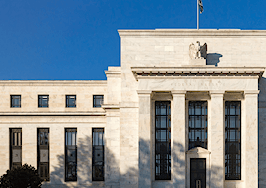Mortgage lenders faced a double-whammy in May, with demand for both purchase loans and refinancing falling despite the fact that mortgage rates came back down after surging in February in March.
The pullback in “rate-and-term” refinancings — in which homeowners refinance to take advantage of lower rates, rather than to cash out home equity — was particularly pronounced, according to Black Knight’s Originations Market Monitor report.
Rate-and-term refinancing rate locks fell 8.2 percent from April to May, compared to a 3.4 percent drop in purchase locks. Cash-out refinancing locks were also down 3.4 percent from month to month.
Compared to a year ago, rate-and-term refi locks were down 45 percent, while purchase loan rate locks were up 42 percent. Cash-out locks also increased by 32 percent from a year ago.
On the bright side for lenders at least, the average loan amount increased by $6,000 in May, to $316,500, which Black Knight said was likely to be the result of rising home prices and demand for jumbo mortgages.
Refinancing accounted for only 44 percent of all rate locks in May, down from over 61 percent a year ago.

Source: Black Knight Originations Market Monitor.
The drop in purchase locks from April to May can largely be explained by inventory shortages, said Black Knight Secondary Marketing Technologies President Scott Happ, in a statement.

Scott Happ
But the drop in refinance locks “seems to have more to do with borrower psychology,” Happ said. “Certainly, February’s rise in rates drained some of the excitement in the market, but despite significant increases in refinance incentive since then, refinance activity simply hasn’t rebounded as expected.”
A pullback in interest rates in April increased the number of homeowners who have an incentive to refinance by 15 percent, to more than 14 million, Happ said, “but rate lock volume has failed to keep pace. Refinance rate locks are instead down 27 percent over the same time frame, decelerating in what would otherwise be a time of expected acceleration.”
While mortgage rates stabilized in May, this week’s Federal Reserve meeting could send rates surging again, with new inflation numbers and tapering of the Fed’s mortgage bond purchases likely to be on the agenda.
Lenders have been expecting a dropoff in refinancings if interest rates rise, and are looking to grow their purchase loan business. LoanDepot, for example, has formed four joint ventures since December — three with homebuilders, and another with Farm Bureau Bank.
Although a recent Fannie Mae survey found that most Americans think that the scarcity of listings makes it a bad time to buy a home, a record 72 percent said they’d still rather buy than rent if they were to move.

Anthony Hsieh | Photo credit: LoanDepot
In a May 3 investor call, loanDepot founder and CEO Anthony Hsieh said that rising home values have also created “tons of opportunities for cash-out refinances.”
“Americans are enjoying record low loan-to-value and high equity,” Hsieh said. “There’s lots of consumption, through all types of purchases, as we all know, in today’s market. We’re seeing a tremendous demand and increase in cash-out refinance, and as you know, purchases continue to be very, very healthy.”
In a recent Twitter post, Reali Loans assured homeowners that, “An out-of-this-world home theater system is an acceptable reason to refinance your mortgage.”













